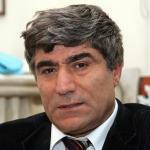International Hrant Dink Foundation has published Hrant Dink’s book titled “İki Yakın Halk İki Uzak Komşu” (Two Close People Two Far Neighbors), which Dink had written, before he was murdered, for Foreign Politics Program of the Turkish Economic and Social Studies Foundation (TESEV).
“Dink’s Memento”
Etyen Mahçupyan, who prepared the book, said in the preface he wrote that “This book is an invitation…invitation to the heart, to love, to the conscience, to all of humanity…This is a memento of a man of action who made his mark on our souls, who soften up all of us with a single touch…”
According to Mahçupyan, what the director of the Foreign Politics Program Mensur Akgün expected from Dink was “a balanced monographic text towards solution, dealing with the dimensions of the relations between Turkey and Armenia, but at the same looking at the relations between Turks and Armenians in the background as well.” However, Dink realized that Akgün would not have found the text he had written in 2005 suitable. In fact, Akgün asked for some changes in the book that he thought was a “bit” far from the distant approach that was asked. Later Hrant Dink was taken from us.
When Akgün said that publishing this book was a matter of a debt of loyalty and that it was more fitting that the International Hrant Dink Foundation published it, the book became published under the editorship of Mahçupyan.
Mahçupyan writes in the preface, “It is difficult to believe, but this book had completely gotten out of my mind. Perhaps losing Hrant had forced my inner world reject everything that was connected to him, fearing that he would be replaced. However, in time, this book became one of the means of healing my soul.”
Dink tells in his book how important the relations between Turkey and Armenia are for the solution of the “Armenian Problem”, the disagreement in the Turkish-Armenian “lack of any connection”.
The book includes the complete text of Dink’s famous speech titled “Su çatlağını buldu”, which was given at BilgiUniversity, the text of Armenian Foreign Minister Vartan Oskanyan’s 2005 call to Turkey and Dink’s speeches given at the commissions in the Turkish Parliament.
The responsibility of filling in the blank pages
While dedicating the book to the Armenian people, who, after living on this land as a productive people for thousands of years, were, during those painful years, taken away from the land where they used to live and their ties with life and the civilization they created were ripped off, and to all the innocent Anatolians, whether Armenian, Turkish or Kurdish, who lost their lives during this period, Dink adds the following:
From the perspective of the Turkish-Armenian relations, our common destiny that began the centuries ago and that will go for centuries is once more right before us.
Our ancestors filled in their own pages more or less.
The real problem is how we will fill in the blank pages today.
Are we going to behave like those responsible for the great catastrophe or like those who have taken their lesson and are trying to fill in the pages like civilized people? This is the greatest responsibility put in front of us.
Those who escape from this responsibility or those who still want to fill in the pages with bad and painful incidents are actually not any different from those who are responsible for those pains suffered in the past.
We, those who feel responsible, must not allow them monopolize the job of filling in these pages.
Dink’s book is an important source for those who want to fill in the blank pages in a different way, for those who care about this. At the same time, as another example of his ability to enter dialog even with those who were trying to shut him up through harsh means, it is an invitation to everyone. (TK/EZÖ/TB)




